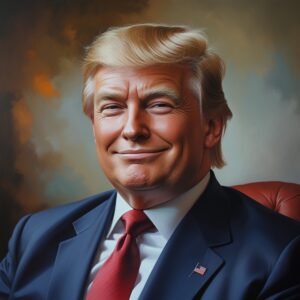Donald Trump, who re-entered the White House in January pledging to be a “peacemaker,” has made a striking decision to plunge the United States into the volatile standoff between Iran and Israel.
Rather than fostering stability in the Middle East since his return to power, Trump now oversees a region edging closer to intensified conflict, one in which the US is actively engaged.
In a nationally televised address from the White House, shortly after tweeting that American forces successfully targeted three Iranian nuclear facilities, President Trump declared the strikes a “spectacular success.”
He voiced hope that this military action would pave the way toward a lasting peace, effectively preventing Iran from advancing its nuclear ambitions.
 Iran downplayed the impact, claiming only minor damage at its heavily fortified Fordo nuclear site. Time will reveal which account is accurate.
Iran downplayed the impact, claiming only minor damage at its heavily fortified Fordo nuclear site. Time will reveal which account is accurate.
Surrounded by Vice-President JD Vance, Secretary of State Marco Rubio, and Defense Secretary Pete Hegseth, Trump issued a stern warning to Iran: unless they halt their nuclear program, future attacks would be “far worse and a lot easier” to carry out.
“There are many targets left,” Trump emphasized, adding that the US would pursue them with “speed, precision, and skill.”
Despite the president’s confident tone, prolonged American military involvement in Iran could prove disastrous not only for the US but also for regional and global stability.
UN Secretary-General António Guterres cautioned against a potential “spiral of chaos” resulting from America’s escalation, especially since the Middle East is already “on edge.”
If Iran retaliates—as Supreme Leader Ayatollah Ali Khamenei has vowed it would—the US might be compelled to respond further, worsening the situation.
Trump’s earlier tough stance, demanding Iran’s “unconditional surrender,” placed him in a position where backing down would be politically difficult. Iran’s threats mirrored this inflexibility, limiting diplomatic options.
This scenario is a textbook example of how conflicts ignite and spiral beyond the control and expectations of those involved.
Although Trump initially set a two-week deadline for Iran, that period shrank drastically to a mere two days when, on Saturday night, he announced the strikes.
Was the two-week window a negotiating tactic, designed to lull Iran into complacency? Or did behind-the-scenes diplomacy, spearheaded by Trump’s appointed peacemaker Steve Witkoff, collapse?
Details remain unclear, but Trump’s social media posts and televised remarks suggested he still hopes for peace.
Yet this may be wishful thinking. While Israel has made significant strides in curbing Iran’s military strength, the ayatollah remains armed and capable.
Now begins a tense period of uncertainty: how will Iran react to attacks on three key sites, including the prestigious Fordo nuclear complex?
Trump seems to be banking on these strikes to pressure Iran into tougher negotiating positions. However, a nation unwilling to engage diplomatically under Israeli assault is unlikely to shift course merely because of American military action.
While Trump portrayed the operation as a singular, definitive success, if subsequent strikes are necessary, the pressure to act again will mount, raising the stakes for a president risking substantial political fallout for potentially limited military gain.
This gamble carries not only international security implications but also domestic political challenges.
Opposition to a US strike on Iran came not only from Democrats but also from factions within Trump’s own “America First” base.
His decision to deliver the address flanked by close advisors may have been an effort to display solidarity within his party.
Vice-President Vance has been vocal about advocating for more restrained US foreign engagement and recently urged supporters on social media to trust Trump’s generally non-interventionist stance.
If this operation remains isolated, Trump might weather internal divisions. If it drags the nation into a deeper conflict, he could face significant backlash from within.
Saturday’s strike marked a bold departure for a president who once boasted about avoiding new wars during his first term and frequently criticized predecessors for entangling the US in foreign conflicts.
Trump has now initiated a high-stakes move. What follows may very well escape his control.